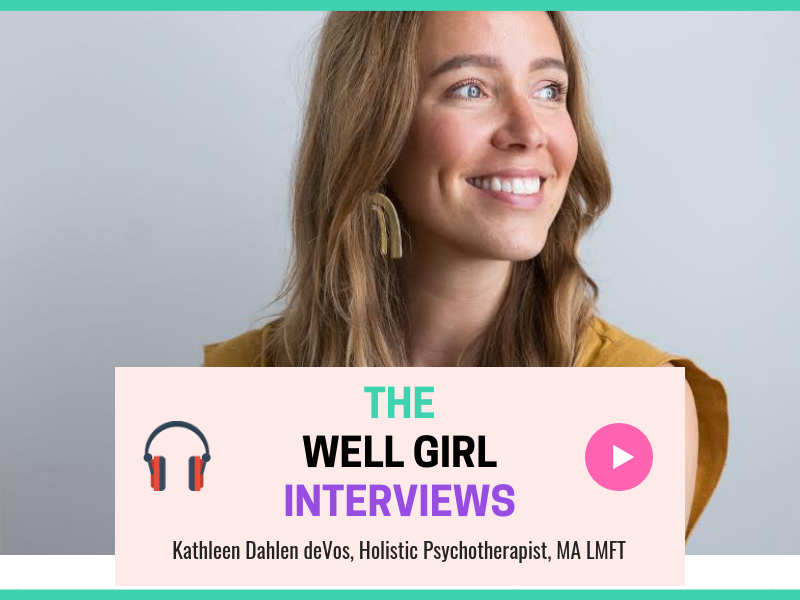The
In this episode, we speak with Kathleen Dahlen
She confidently supports clients in navigating life transitions with authenticity, grace, and vitality. Listen and read below.
“I’m going to therapy.” It’s a sentence that often injects fear, concern,
Why do we look at our emotional wellness any different than our physical health? We’re not encouraged to start eating healthy or exercise when the problems arise because we know that keeping our bodies healthy and happy starts with maintaining good routine habits.
It’s time to look at our daily feelings the same way.
Holistic psychotherapists, such as Kathleen Dahlen deVos look at their clients as a whole. It’s not about fixing a problem, but about addressing and understanding all aspects that make them up to impact self-awareness and self-esteem in a positive way.
In the latest episode of The Well Girl Interviews, I spoke with her about mental health stigmas, how she treats stress, burnout, anxiety, her tips about taking the leap, trying out therapy and how to start getting curious about our daily thoughts and feelings.
She had a lot of incredible insight to consider! So keep an open mind and heart and listen in. You can also read below on to some highlights. Stay tuned for more articles from this interview regarding Kat’s tips on how she treats work burnout and anxiety.
Q: Going to therapy still often has a stigma surrounding it, how do you go about combatting this?
A: The good news is I think it’s starting to change. One of my platforms as a psychotherapist is that I really want people to understand that going to see a therapist isn’t something you should do when you’re already in crisis. It’s a great tool to use when you get off track and you’re struggling, but therapy is going to benefit you even more if you go proactively. The same reason we eat our broccoli, go to yoga class or go to spin class, we want to keep ourselves healthy so we’re not having to then get behind the eight ball and try to get ourselves healthy when we’re already seeing our health start to fail.
Go to therapy before you need it. Start stocking your tool belt so when you inevitably find yourself in turmoil, you already have the resources to use, so you’re maybe not falling down the rabbit hole as deeply.
Q: How do you know when it’s time to seek out therapy?
A: I think everyone could go to therapy… Just as a proactive tool for self inquiry but I think for a lot of us when we maybe could benefit from therapy, I think we have that nagging sense in the back of our mind that something could be better or something is off. Sometimes it just feels like a really daunting process, in terms of where to even begin but I think if we can confront that something’s off premonition that can be really helpful.
Q: Why do you think many of us resist therapy or think we don’t need it?
A: We often default to a state of fineness. ‘Things are fine, things are going good – my job is fine, my life is fine, it’s good enough.’ Even if there’s this nagging sense that things could be better or we could be happier, oftentimes we would rather stay with the ‘fine’ that we know versus do the hard work, maybe get really uncomfortable, confront some things that we’re afraid to confront in the hopes that there might be something better because the risk there is, what if there’s not?
It’s this very natural human desire and inclination to maintain homeostasis. Once we get to a place of ‘this is fine’, oftentimes we get a little bit stuck there because the risk to get to the next level – to get to something maybe even better then fine can feel overwhelming or scary.
Q: What tips do you have for someone seeking out therapy for the first time?
A: I believe the relationship with your therapist is the thing that’s going to be the most transformative. Whether it’s a cognitive behavior therapist, behavioral therapist or holistic psychotherapist – just find someone you feel really comfortable sitting across from for 50 minutes, someone you feel gets you and that’s what is going to get you the best results.
Q: How might holistic psychotherapy be different than other types of therapy?
A: A holistic psychotherapy approach might be more long term because I want people to feel better as soon as possible but I’m not looking to just get people in and out. It’s not going to be a quick fix because when we are doing this depth work, we’re looking at how far back do these patterns go, how long do you remember doing them? We’re often changing beliefs and stories that have been in place for decades and that’s inherently going to take longer. My goal isn’t to keep people in therapy forever, but it’s no six-sessions in and out type thing.
Q: How can someone start implementing some of your holistic psychotherapy practices in their daily lives today?
A: Start getting curious. I have my clients open a new note in your phone and anything during the day that peaks their curiosity about themselves (whether it’s a reaction, sad thoughts, etc). It’s starting to develop the muscle of insight – just jotting down things that make us pause… It helps us see patterns over time. Even as we are drawing awareness to these curiosities, they marinate in the back of our mind and they can start to reveal some bigger insights to us.
Ten minutes of mindfulness practice. It starts to rewire the brain in the most profound way. There are so many great apps: Calm, Insight Timer, Headspace, all these great apps with really wonderful guided mindfulness practices and it doesn’t have to be this big ordeal, just 10 minutes in the morning and over time with practice we notice such big shifts in how we feel, how reactive we are, our self critic- our tendency to be distracted or to numb out.
Read “The Gifts of Imperfection” by Brené Brown. I recommend this to all my clients. It’s a really lovely entry point into this world and can give people more language for talking about this.
Kathleen Dahlen deVos Info:




